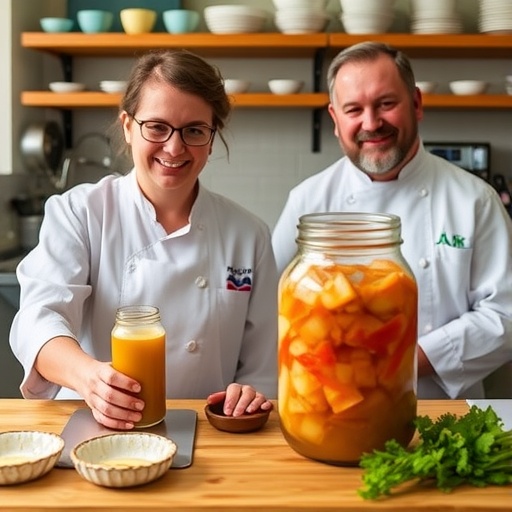In a groundbreaking collaboration bridging the culinary arts and microbial ecology, scientists and chefs have jointly pioneered a participatory science approach that leverages fermented foods as dynamic platforms for advancing our understanding of microbial ecosystems. Their recent study intricately examined the microbial communities present in traditional fermented products such as kombucha, kimchi, and chow chow, ultimately demonstrating not only the scientific rigor of this method but also its potential to actively engage the public in complex biological processes.
The essence of this research lies in its innovative framework: transforming the often esoteric study of microorganisms into an accessible, hands-on experience for non-experts through cooking-class style workshops. Conducted at the North Carolina Museum of Natural Sciences, these workshops served as incubators for interactive learning, where scientists collaborated with chefs to instruct K-12 teachers and interested members of the public in the art and science of fermentation. Over multiple sessions, participants were guided step-by-step in preparing specific fermented products, which were subsequently sampled and analyzed to map changes in microbial diversity over time.
One of the central technical pillars of this inquiry was the meticulous collection of samples at distinct fermentation stages. Liquid aliquots of chow chow and kimchi were procured on the third and tenth days of fermentation, while kombucha samples were collected on the fourth and eighth days. This temporal sampling strategy provided a longitudinal perspective of microbial succession, allowing researchers to characterize shifts in community composition and abundance as fermentation advanced – a critical factor in understanding how environmental and substrate variables dictate microbial dynamics.
Subsequent analysis employed high-throughput DNA sequencing techniques to unravel the complex microbial consortia inhabiting each sample. The sequencing data captured not only species diversity but also relative abundance profiles, delivering a comprehensive microbiological snapshot. This approach aligns with contemporary standards in metagenomics, which facilitate the identification of uncultivable species and the detection of subtle community shifts that would be otherwise undetectable with conventional culturing methods.
Beyond mere microbial cataloging, the study unveiled intriguing ecological distinctions tied to ingredient choice. For instance, kimchi prepared with cabbage showcased significantly different microbial populations compared to kimchi made with daikon radish, highlighting how raw material selection influences microbial assembly. Contrastingly, kombucha samples fermented using green tea versus black tea – despite both teas deriving from Camellia sinensis but undergoing different processing – did not exhibit notable differences in microbial species, suggesting that fermentation dynamics may override subtle substrate variations in certain contexts.
Importantly, this research validated the participatory science approach by aligning its findings with established scientific literature. The reproducibility of microbial patterns associated with well-characterized fermented foods demonstrates the method’s reliability. It underscores that non-specialists, when adequately guided, can generate high-quality scientific data while engaging deeply with scientific content, blurring the boundaries between expert and citizen scientist.
The collaborative nature of the project also speaks volumes about the enrichment that emerges when culinary expertise converges with microbiological research. Chefs’ intimate knowledge of fermentation nuances transformed theoretical concepts into tangible experiences, fostering a richer appreciation of microbial ecosystems among participants. This synthesis of science and gastronomy reveals the potential for novel educational paradigms that simultaneously stimulate intellectual curiosity and culinary creativity.
Moreover, the study embodies a methodological advancement for participatory science by emphasizing scalability and cost-effectiveness. With workshop participation yielding 18 to 23 samples per fermented product, the model asserts its feasibility for broader application without necessitating prohibitive resources. Researchers posit that this approach could catalyze expansive community-driven projects aimed at diverse fermentation systems, ecological questions, and perhaps additional biological inquiries beyond food microbiomes.
Understanding the vital roles microbes play in food fermentation transcends academic interest, as it intersects with public health, nutrition, and food sustainability. The project’s emphasis on microbial diversity and ecology demystifies microorganisms’ beneficial functions, counteracting prevalent misconceptions that often stigmatize microbes solely as pathogens. By illuminating the complexity and utility of microbial ecosystems in everyday life, this initiative promotes scientifically informed perspectives necessary for advancing health and environmental stewardship.
The open-access publication of this work offers practical takeaways, including fermentation recipes, empowering readers to embark on their own explorations of microbial ecology through cooking. Such transparency enhances reproducibility and invites diverse audiences to contribute to the evolving tapestry of fermentation science, fostering an inclusive culture of participatory research.
This research was spearheaded by a multidisciplinary team comprising experts from North Carolina State University, the North Carolina Museum of Natural Sciences, Duke University, the University of West Florida, and the University of North Carolina at Chapel Hill. Their collaborative efforts were supported by the National Science Foundation, highlighting the importance of institutional investment in innovative science education and public engagement initiatives.
As the landscape of microbiological research continues to evolve, this study exemplifies a transformative model that integrates community involvement with scientific discovery. It propels participatory science into mainstream discourse while contributing valuable data on fermented food microbiomes. The implications extend beyond microbial ecology, offering a blueprint for democratizing science and fostering interdisciplinary partnerships that elevate both research quality and societal impact.
By harnessing the cultural ubiquity and sensory appeal of fermented foods, this project turns everyday culinary practices into portals of scientific inquiry. It creates meaningful intersections where education, research, and gastronomy coalesce, inspiring new generations of citizen scientists and professionals alike to explore the unseen microbial worlds that permeate our diets and environments.
Subject of Research: Not applicable
Article Title: Cooking-Class Style Fermentation as a Context for Co-created Science and Engagement
News Publication Date: 15-Aug-2025
Web References: https://journals.asm.org/doi/10.1128/spectrum.02660-24
References:
McKenney, E., Berman, H., Roche, C., et al. “Cooking-Class Style Fermentation as a Context for Co-created Science and Engagement.” Microbiology Spectrum, 2025. DOI: 10.1128/spectrum.02660-24
Image Credits: Lauren Nichols
Keywords
Fermentation, Microbial Ecology, Participatory Science, Kimchi, Kombucha, Chow Chow, Microbiome, DNA Sequencing, Citizen Science, Microbial Diversity, Food Science, Public Engagement




